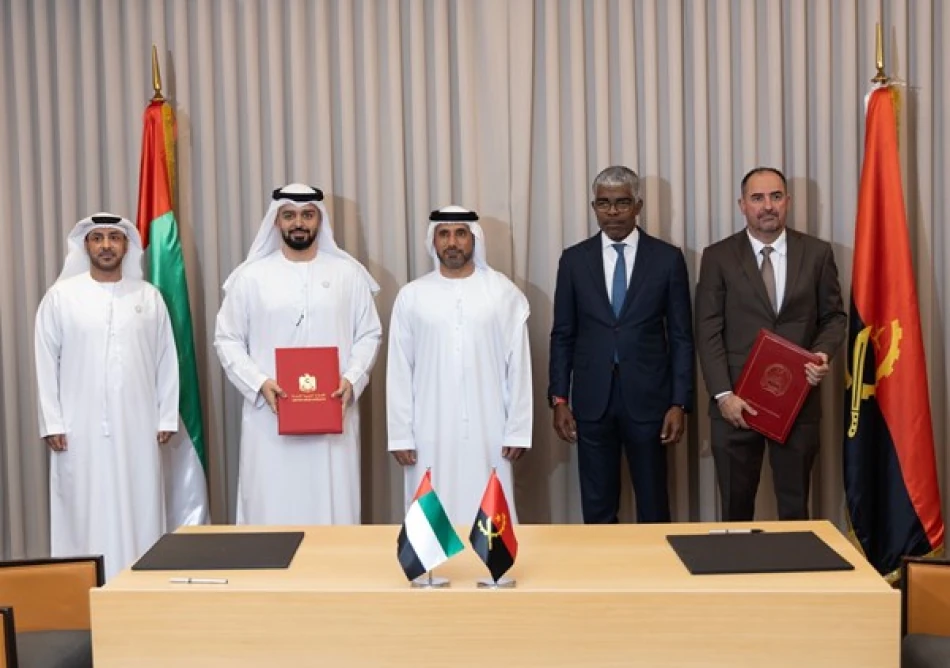
Abu Dhabi Ports Expands Foothold in Angola, Strengthening Global Maritime Presence
Abu Dhabi Ports Doubles Down on Angola with $6M Fleet Expansion and Digital Trade Platform
Abu Dhabi Ports Group is significantly expanding its African footprint with a comprehensive $6 million investment in Angola's logistics infrastructure, including 75 new trucks and trailers alongside a unified digital trade platform. The move positions the UAE operator as a dominant force in West Africa's gateway economy, where Luanda port handles three-quarters of Angola's container traffic and serves as a critical link to landlocked neighbors like Democratic Republic of Congo and Zambia.
Strategic Infrastructure Investment Targets Regional Hub Ambitions
The fleet expansion nearly doubles Abu Dhabi Ports' trucking capacity in Angola through its 90%-owned joint venture, Nawatom Unicargas Logistics Services, bringing the total to 70 trucks and 95 trailers. This land-based expansion complements the group's earlier commitment to invest $250 million through 2026 in redeveloping and expanding the Nawatom Ports-Luanda Terminal.
The timing reflects a broader trend of Gulf operators seeking growth beyond saturated Middle Eastern markets. Similar to DP World's aggressive African expansion and Cosco's Belt and Road initiatives, Abu Dhabi Ports is betting on Angola's potential as a regional trade hub serving Central and West Africa's growing economies.
Digital Trade Platform to Streamline Angola's Complex Bureaucracy
Perhaps more significant than the physical assets is the three-year agreement to develop the "Jawl" digital platform in partnership with Angola's Logistics and Shipping Regulatory Authority (ARCLA). The unified system will integrate customs procedures, port operations, and trade documentation across sea, land, and air cargo movements.
Technology Transfer Strategy
Abu Dhabi Ports' digital arm, Maqta Gateway, will leverage expertise from recent acquisitions including T-Tech (customs and border technology) and Dubai Technology (trade and transport solutions). This approach mirrors successful digital transformation models implemented by Singapore's port authority and reflects growing recognition that modern ports compete on data integration as much as physical capacity.
Angola's complex bureaucratic environment makes digital streamlining particularly valuable. The platform will consolidate the National Logistics Platform Network, Unified Port Window, Foreign Trade Unified Window, and Customs Management System into a single interface—potentially reducing cargo dwell times and trade costs significantly.
Market Implications and Regional Competition
The investment positions Abu Dhabi Ports to capture growing trade between resource-rich Central Africa and global markets. Angola's oil-dependent economy is diversifying, while neighboring DRC and Zambia's mineral exports increasingly flow through Luanda rather than more distant South African ports.
This strategy puts Abu Dhabi Ports in direct competition with established players including Bollore Group's African logistics network and APM Terminals' regional operations. However, the UAE operator's integrated approach—combining port operations, inland logistics, and digital platforms—offers potential competitive advantages.
Beyond Logistics: Healthcare and Maritime Training Expansion
Five preliminary agreements signed with Angolan government entities extend beyond traditional port services. A partnership with UAE medical services provider Burjeel Holdings will explore healthcare logistics opportunities, while maritime academy initiatives aim to develop local talent.
These ancillary services reflect a sophisticated market entry strategy that builds government relationships while creating additional revenue streams. The maritime training component particularly addresses Angola's need for skilled personnel as it develops domestic shipping capabilities.
Investment Outlook and Risk Assessment
Abu Dhabi Ports' Angola expansion represents a calculated bet on African growth despite currency volatility and regulatory challenges. The $250 million total commitment through 2026 is substantial but manageable for the state-backed operator, while the phased approach allows for course corrections.
Success will largely depend on Angola's economic diversification progress and regional trade growth. However, the combination of strategic port location, digital integration capabilities, and comprehensive service offerings positions Abu Dhabi Ports well to capitalize on West Africa's logistics modernization needs.
Most Viewed News

 Layla Al Mansoori
Layla Al Mansoori






